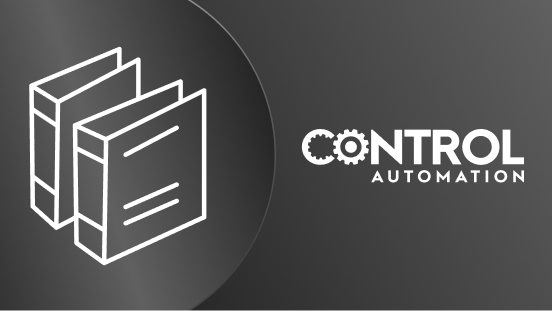
The simple PLC ladder diagram (LD) commands consist of contacts and coils, arranged in sequences that mimic…
Textbook

A simple control system drawn in block diagram form looks like this: Information from the measuring device…
Textbook

There are several different methods useful for causing an AC induction motor to brake, or slow down: DC…
Textbook

A limit switch detects the physical motion of an object by direct contact with that object. An example of a…
Textbook

The reason why a pneumatic control valve’s stem position corresponds linearly to the amount of air…
Textbook

The simplest form of 4-20 mA current loop is the type used to represent the output of a process controller,…
Textbook

DC electric motors generate torque by a reaction between two magnetic fields: one field established by…
Textbook

In the United States, the most common language used to program PLCs is Ladder Diagram (LD), also known as…
Textbook

An electric motor is often used as a discrete control element in a control system if driving a pump, conveyor…
Textbook

In order for any PID controller to be practical, it must be able to do more than just implement the PID…
Textbook

To better understand the design and operation of self-balancing pneumatic mechanisms, it is helpful to examine…
Textbook

Although it seems each model of PLC has its own idiosyncratic standard for programming, there does exist an…
Textbook

As discussed at the beginning of this chapter, instrumentation safety may be broadly divided into two…
Textbook

Virtually any mass above absolute zero temperature emits electromagnetic radiation (photons, or light) as a…
Textbook

The vast majority of PID controllers in service today are digital in nature. Microprocessors executing PID…
Textbook

AC induction motors are based on the principle of a rotating magnetic field produced by a set of stationary…
Textbook

Feedback Control System Components Before we begin our discussion on process control, we must define a few key…
Textbook

The purpose of a control valve actuator is to provide the motive force to operate a valve mechanism. Both…
Textbook

Perhaps the most basic and necessary protective relay function is overcurrent: commanding a circuit breaker to…
Textbook

Negative feedback systems, in general, tend to cause confusion for those first learning their fundamental…
Textbook

A very common form of on/off valve used for pneumatic and hydraulic systems alike is the solenoid valve. A…
Textbook

A quantitative PID tuning procedure is a step-by-step approach leading directly to a set of numerical values…
Textbook

Electrical power grids primarily consist of three-phase AC circuits. This means most power lines (transmission…
Textbook

An engineer named Bob Metcalfe conceived the idea of Ethernet in 1973, while working for the Xerox research…
Textbook

In a manually-controlled process, a human operator directly actuates some form of final control element…
Textbook

Pipe is a hollow structure designed to provide an enclosed pathway for fluids to flow, usually manufactured…
Textbook

Most of these formulae appear in molecular chemical form rather than structural form. For example, ethanol…
Textbook

The Law of Continuity for fluids states that the product of mass density (\(\rho\)), cross-sectional pipe area…
Textbook

Certain types of nuclear radiation easily penetrates the walls of industrial vessels, but is attenuated by…
Textbook

Those familiar with industrial instrumentation will find much within the electric power industry remarkably…
Textbook

Much has been written about the benefits of robust PID control. Increased productivity, decreased equipment…
Textbook

Several different technologies exist for the conversion of fluid pressure into an electrical signal response.…
Textbook

The Law of Mass Conservation states that matter can neither be created nor destroyed. The Law of Energy…
Textbook

pH is the measurement of the hydrogen ion activity in a liquid solution. It is one of the most common forms of…
Textbook

Regulating the electric power sent to an electric motor is a task performed by high-speed switching…
Textbook

A technological advance introduced in the late 1980’s was HART, an acronym standing for Highway…
Textbook

Tube, like pipe, is a hollow structure designed to provide an enclosed pathway for fluids to flow. In the case…
Textbook

A wise PLC programmer once told me that the first thing any aspiring programmer should learn about the PLC…
Textbook

A very common method for directly controlling low flow rates of fluids is to use a device known as a metering…
Textbook

Nearly every technical course teaches and tests students on definitions, basic concepts, and at least some…
Textbook
